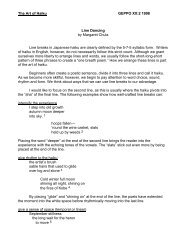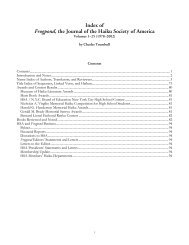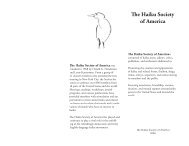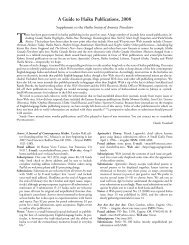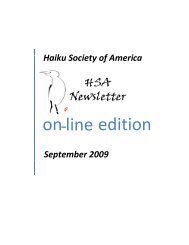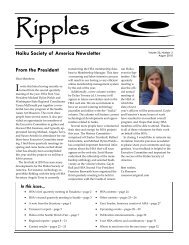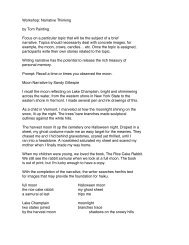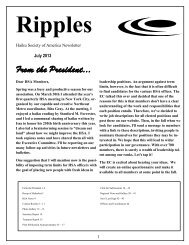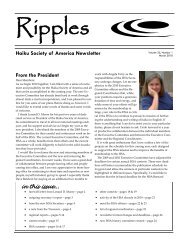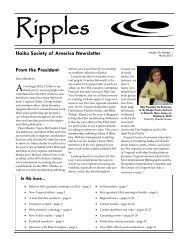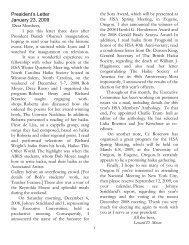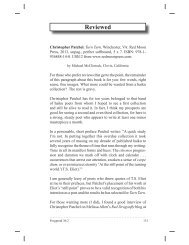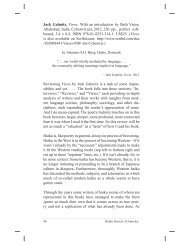Frogpond 32.2 ⢠Summer 2009 (pdf) - Haiku Society of America
Frogpond 32.2 ⢠Summer 2009 (pdf) - Haiku Society of America
Frogpond 32.2 ⢠Summer 2009 (pdf) - Haiku Society of America
Create successful ePaper yourself
Turn your PDF publications into a flip-book with our unique Google optimized e-Paper software.
had to protect my reputation, and thus regretfully had to rejectthe submission. I loved the comment, which made me laughand mentally thank him, even though I didn’t agree with hisassessment (later, some <strong>of</strong> those very poems were picked up bytwo different editors, something poets discouraged by rejectionsmay like to remember). Another editor actually writes kindnotes in response to the accepted and rejected poems. This isfar and above what any poet expects, especially consideringthe massive work each editor deals with, but this poet becamea loyal contributor to his journal as a result <strong>of</strong> the practice.I know another editor who carefully hones his journal until eachissue is a polished gem. How does he get such quality materialfrom journal to journal? He is efficient and organized, a personwith a sensitive nature and keen intelligence who has carefullypulled together a likeminded team. He takes time to know hispoets, and he is respectful. Another <strong>of</strong> these five outstanding editorsis a fine poet himself—actually, all <strong>of</strong> them I’ve mentionedwrite venerable poetry. Working to make his journal the best, heseeks feedback; then incorporates workable suggestions. This isthe kind <strong>of</strong> editor that poets want to support with their best work.Out <strong>of</strong> all the editors I have worked with, one became a mentor,a role neither <strong>of</strong> us would have imagined in the beginning<strong>of</strong> our relationship, nor a role either <strong>of</strong> us consciously soughtElizabeth Searle Lamb, later dropping her middle name andreferring to herself as Elizabeth Lamb, was <strong>Frogpond</strong> editorfrom 1984 to 1991, and then once again for one year in 1994.Before taking on that mantle, she was one <strong>of</strong> the original smallband <strong>of</strong> haiku pioneers in the United States who helped shapethe haiku movement in the West. Although an outstandingpoet, she was a natural editor, cut out to do the exacting workdemanded by the job. She didn’t know the meaning <strong>of</strong> rudeor arrogant because she was by nature self-effacing and polite.Nevertheless, she had a perceptive editorial eye, passing overany poem that didn’t meet her standard <strong>of</strong> excellence. Shetook time to correspond with poets who submitted to thejournal and sought her comments. A rejection slip from her. . . . . . . . . . . . . . . . . . . . . . . . . . . . . . . . . . . . . . . . . . . . . . . . . . . . . . . . . . . . .40 <strong>Haiku</strong> <strong>Society</strong> <strong>of</strong> <strong>America</strong>



